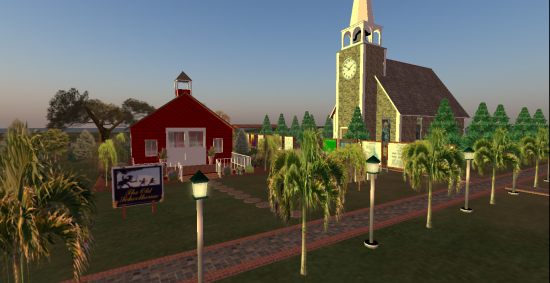I am looking for volunteers for an OSGrid Academic Consortium — somewhere between four to eight schools who want to have free regions in an education-oriented community located near to one another on the non-profit OSGrid.
Here is how it will work. I will take care of the setup — reserving the regions, installation, and configuration files. You just provide a machine, download and run the files, and make sure your machine stays on.
There are no rules, and no additional participation required. This is a test to see how well educational institutions can do on OSGrid. You don’t have to commit to anything, and can always move your regions elsewhere if you need to.
I’ll be setting everything up in July. If you’re interested in participating, email me at rogate@champlain.edu or visit my region — CreativeTwists — on OSGrid, located next door to Teravus Plaza.

My immediate motivation for this project is that Linden Lab discontinued their education discount. Regions now cost over $3,500 a year. Despite the steep price tag, many educators are still hanging in, because of the community and collaboration they find in Second Life.
That is a false sense of security, especially because you can maintain your network and contacts in Second Life without having to own any land there.
Of course, OpenSim is still alpha software. The software changes constantly, and some hosting providers are behind the eight-ball when it comes to upgrades. That leaves some customers falling short when it comes to new features, stability and security enhancements. A hosting provider can also disappear with no warning, leaving customers stranded until they migrate all their regions somewhere else.
Hosting regions on your own also has its problems, and most educators probably don’t have the ability to run OpenSim on their own.
Thus my idea for a half-way approach. With a consortium of educational institutions, we can share a presence on OSGrid. This would relieve the schools of a great deal of administrative tasks and overhead, since they would be handled by the OSGrid staff themselves.
Meanwhile, I would assist with the initial setup of the regions.
I would like to start out with four to eight institutions, each with four regions, plus an additional four regions of common space. All regions would be adjacent to one another.
Here are just some of the benefits:
- The price is right — it’s free.
- You gain experience with OpenSim server administration — with my continuous assistance.
- You have full access to your content. You can create, and can load and save inventory and region archives. It’s all yours!
- You are part of testing a new open source community.
- You have a public presence on the largest grid in the OpenSim universe.
- You can use the common space to reduce some of the redundancy that appears in each and every virtual campus in Second Life.
- You are always bleeding edge as far as the technology is concerned, since OSGrid is a test bed for OpenSim developers.
- You will probably have more regions than you had in Second Life, and maybe more than what you can afford with a hosting provider.
Being on adjacent regions to other educational institutions creates a sense of being part of a community, more so than you can get with hypergrid teleport links between private grids.
I’m not planning to impose any additional rules — all I’m doing is helping you get set up next door to other participants. You can contribute as much or as little as you choose. All you need is the desire to be a pioneer and make it work.
That, and some hardware.
You will need:
- A computer or server running either Windows or Linux.
- The ability to open ports 9000 through 9005 and pass traffic through to a fixed IP address. (You might to check with your system administrators about this part.)
I will get you the OpenSim distribution configured to work with OSGrid, and the setup files to properly position your regions on the grid.
- Prof: Schools moving to OpenSim should pay for hosting - January 2, 2012
- It’s time to move all grids south - September 11, 2011
- Five steps to OpenSim at your school - August 17, 2011
